Même la maladie d’Alzheimer est liée à un mauvais sommeil.
Saviez-vous que « bien dormir » n'est pas seulement bon pour l'énergie, l’immunité et l’humeur mais prévient également la maladie d’Alzheimer?
Professeur Maiken Nedergaard, un neuroscientifique danois, a publié un article dans Scientific American en 2016, soulignant que le temps de sommeil est le moment le plus actif et le plus efficace pour la « désintoxication cérébrale ». Si le processus de désintoxication est entravé, les déchets toxiques tels que l’amyloïde produits pendant le processus de travail du cerveau peuvent s’accumuler dans ou autour des cellules nerveuses, qui peut conduire à des maladies neurodégénératives telles que la maladie d’Alzheimer.
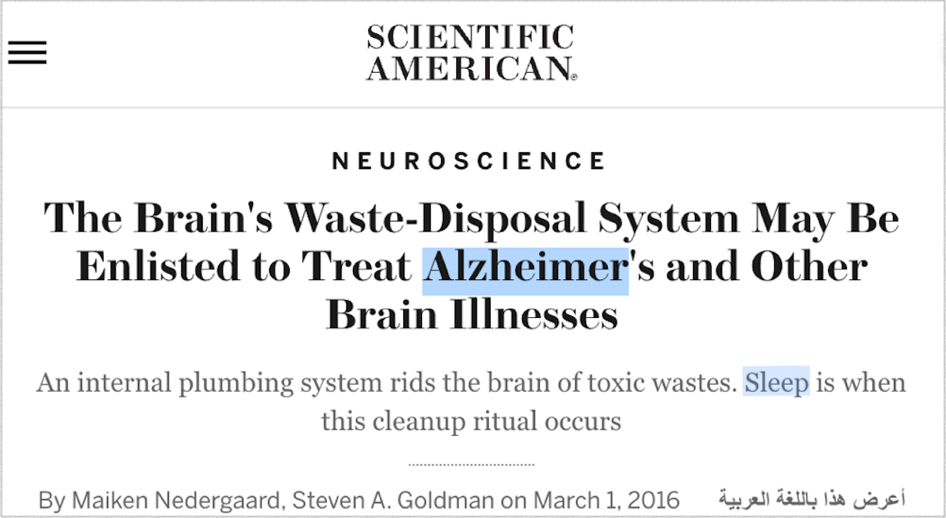
Le phénomène d’influence mutuelle entre sommeil et immunité, qui a été découvert dès le siècle dernier, a été mieux compris au cours de ce siècle.
Le principal neuroscientifique allemand, le Dr. Jan Born et son équipe ont prouvé par des recherches que le système immunitaire a deux performances différentes pendant le sommeil nocturne (depuis 11:00 après midi. à 7:00 suis. le lendemain) et pendant l'éveil: Plus le sommeil lent est profond (SWS), plus la réponse immunitaire anti-tumorale et anti-infectieuse est active (augmentation des concentrations d'IL-6, TNF-α, IL-12, et augmentation des activités des cellules T, cellules dendritiques et macrophages) tandis que la réponse immunitaire pendant l'éveil était relativement supprimée.

La qualité de votre sommeil n'est pas sous votre contrôle.
L’importance du sommeil est incontestable, mais le problème c'est que dormir, ce qui semble être le plus simple, est encore plus difficile pour beaucoup de gens. C'est parce que je dors, comme le rythme cardiaque et la tension artérielle, est régulé par le système nerveux autonome et ne peut pas être contrôlé par la volonté individuelle (conscience).
Le système nerveux autonome comprend le système nerveux sympathique et le système nerveux parasympathique. Le premier est responsable de « l’excitation (tension)», qui mobilise les ressources de l’organisme pour faire face au stress de l’environnement; ce dernier est responsable de la « suppression de l’excitation » (relaxation)», grâce auquel le corps peut se reposer, réparer et recharger. La relation entre eux est comme une balançoire, un côté est haut (fort) et l'autre côté est bas (faible).
Dans des circonstances normales, les nerfs sympathiques et parasympathiques peuvent basculer librement. Cependant, quand certaines raisons (comme la maladie, drogues, travail et repos, environnement, stress et facteurs psychologiques) détruire le mécanisme de réglage entre les deux, c'est à dire, cela provoque un déséquilibre dans lequel les nerfs sympathiques sont toujours forts (facile à tendre) et les nerfs parasympathiques sont toujours faibles (difficile de se détendre). Ce trouble de la régulation entre nerfs (mauvaise capacité de commutation) est ce qu’on appelle la « neurasthénie ».
L'impact de la neurasthénie sur le corps est complet, et le symptôme le plus visible est « l’insomnie ». Difficulté à s'endormir, profondeur de sommeil insuffisante, rêves fréquents et réveils faciles (mauvais sommeil), temps de sommeil insuffisant, et interruption facile du sommeil (difficulté à se rendormir après le réveil). C'est une manifestation de l'insomnie, et l'insomnie n'est que la pointe de l'iceberg lorsque la neurasthénie entraîne un dysfonctionnement de divers organes.
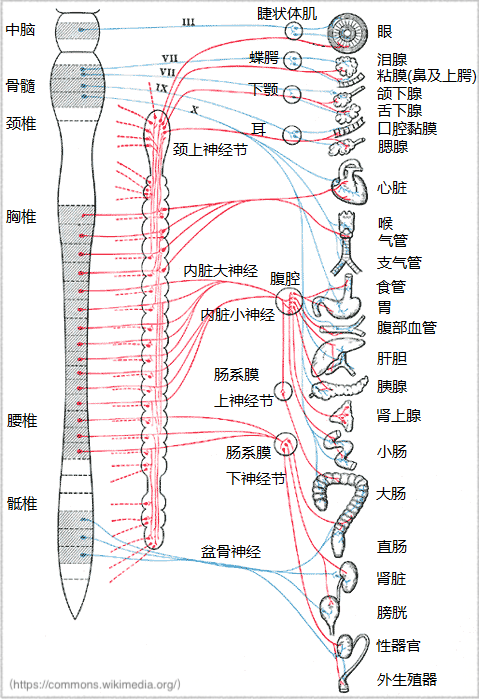
Système nerveux sympathique (rouge) &
Système nerveux parasympathique (bleu)
(Source des images: Wikimédia Commons)
Dans les années 1970, il a été prouvé queGanoderma lucidum a un effet favorisant le sommeil sur le corps humain.
Ganoderma lucidum peut améliorer les symptômes liés à l’insomnie et à la neurasthénie, ce qui a été initialement prouvé par une application clinique dès 50 il y a des années (détails dans le tableau ci-dessous).
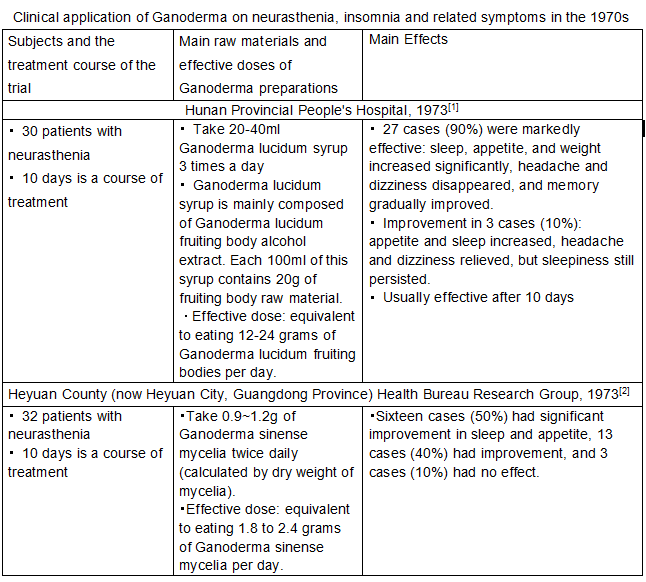
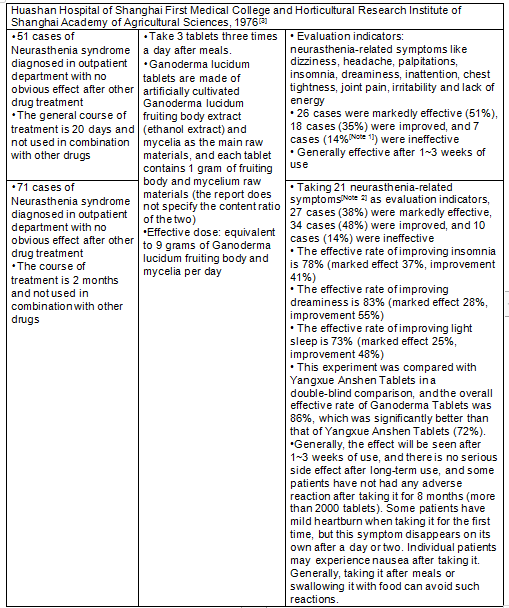
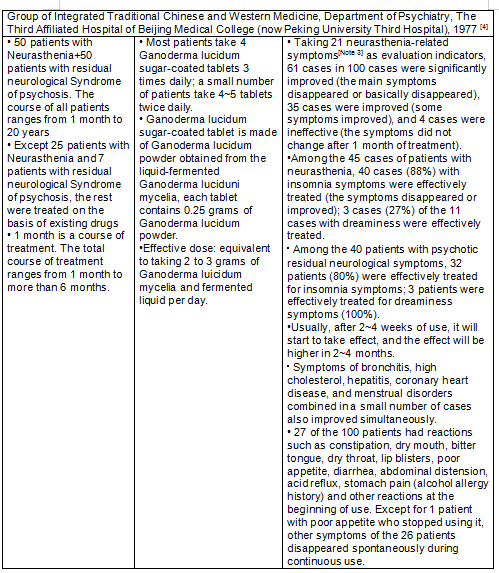
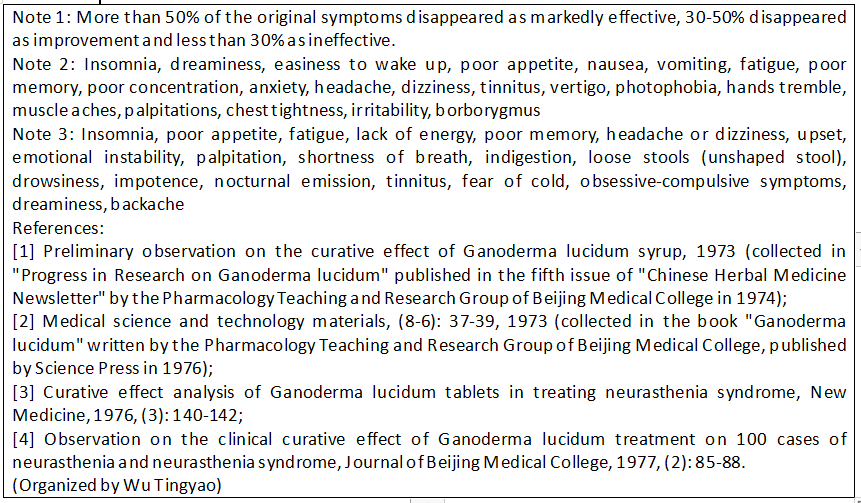
Apprendre de l’expérience clinique deGanoderma lucidum pour aider à dormir
Dans les premiers jours, en raison des ressources limitées de l'expérimentation animale, il y avait plus d'occasions de vérifier l'efficacité de Ganoderma lucidum à travers des expériences humaines. En général, si Ganoderma lucidum est utilisé seul ou en combinaison avec la médecine occidentale, son efficacité pour corriger les troubles du sommeil provoqués par la neurasthénie et résoudre les problèmes liés au sommeil comme l'appétit, la puissance mentale et la force physique sont assez élevées. Même les patients souffrant de neurasthénie tenace ont de grandes opportunités.
Cependant, l'effet deGanoderma lucidum n'est pas rapide, et ça prend habituellement 1-2 semaines, ou même 1 mois, pour voir l'effet, mais à mesure que la durée du traitement augmente, l'effet d'amélioration deviendra plus évident. Problèmes existants chez certains sujets tels que des indicateurs d’hépatite anormaux, taux de cholestérol élevé, bronchite, angine de poitrine, et les troubles menstruels peuvent également être améliorés ou revenir à la normale au cours du traitement.
Ganoderma préparations faites à partir de différents Ganoderma lucidum les matières premières et les méthodes de transformation semblent avoir leurs propres effets, et la dose efficace n'a pas une certaine plage. Essentiellement, la dose requise pour Ganoderma les préparatifs seuls devraient être plus élevés que prévu, qui peut également jouer un rôle complémentaire lorsqu'il est utilisé en association avec des somnifères sédatifs ou des médicaments pour le traitement de la neurasthénie.
Quelques personnes peuvent ressentir des symptômes tels qu'une bouche et une gorge sèches., lèvres brûlantes, inconfort gastro-intestinal, constipation ou diarrhée en début de prise Ganoderma lucidum préparations, mais ces symptômes disparaissent généralement d’eux-mêmes lors de l’utilisation continue du patient. Ganoderma lucidum (aussi vite qu'un ou deux jours, aussi lentement qu'une ou deux semaines). Les personnes souffrant de nausées peuvent également éviter l'inconfort en modifiant la durée de prise. Ganoderma lucidum (soit pendant ou après les repas). On suppose que ces réactions sont probablement le résultat d’un processus d’adaptation des constitutions individuelles à la situation actuelle. Ganoderma lucidum, et une fois que le corps s'adapte, ces réactions seront naturellement éliminées.
Du fait que certains sujets ont continué à prendre Ganoderma lucidum les préparatifs pour 6 ou 8 mois sans aucun effet indésirable, on peut conclure que Ganoderma lucidum a un niveau élevé de sécurité alimentaire et la consommation à long terme n'est pas nocive. Certaines études ont également observé chez des sujets ayant pris Ganoderma lucidum pour 2 mois que les symptômes qui se sont déjà améliorés ou ont disparu progressivement en 1 mois après l'arrêt de l'utilisation de Ganoderma lucidum.
Cela montre qu'il n'est pas facile de faire fonctionner normalement et de manière stable le système nerveux autonome perturbé pendant une longue période après la correction du trouble.. Donc, une maintenance continue peut être nécessaire dans des conditions de sécurité et d'efficacité.
L'expérience nous dit que prendre Ganoderma lucidum pour améliorer le sommeil, il faut un peu plus de patience, un peu plus de confiance, et parfois un peu plus de dosage. Et les expériences sur les animaux montrent Ganoderma lucidum les préparations peuvent être efficaces et pourquoi. Concernant ce dernier, nous l'expliquerons en détail dans le prochain article.
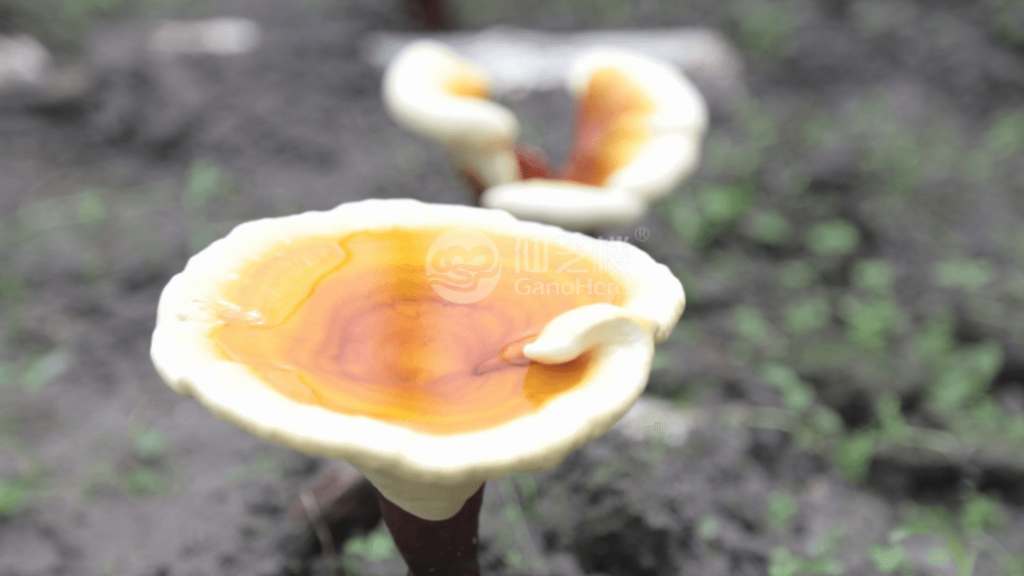
Références
1. Le système d’élimination des déchets cérébraux pourrait être utilisé pour traiter la maladie d’Alzheimer et d’autres maladies cérébrales. Dans: Américain scientifique, 2016. Récupéré de: https://www.scientificamerican.com/article/the-brain-s-waste-disposal -system-may-be-enlisted-to-treat-alzheimer-s-and-other-brain-illnesses/
2. Activité des cellules T et des cellules présentant l'antigène pendant le sommeil. Dans: CerveauImmunitaire, 2011. Récupéré de: https://brainimmune.com/t-cell-antigen-presenting-cell-sleep/
3. Wikipédia. Système nerveux autonome. Dans: Wikipédia, 2021. Extrait de https://en.wikipedia.org/zh-tw/système nerveux autonome
4. Les références pertinentes deGanoderma lucidum sont détaillés dans les notes de tableau de cet article
FIN
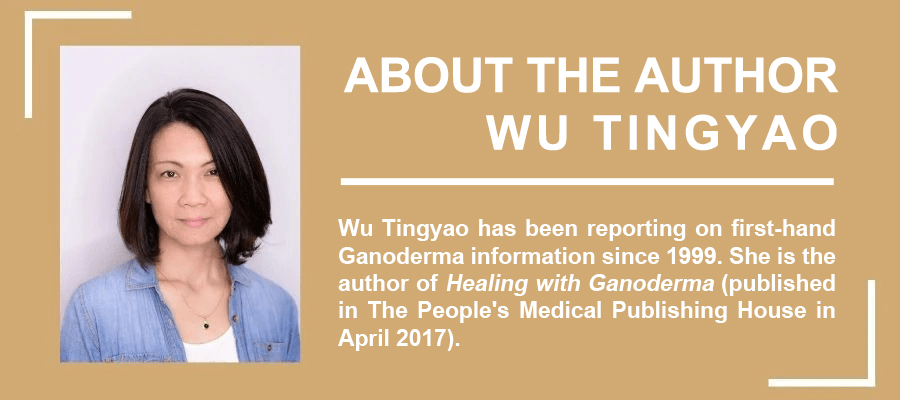
★ Cet article est publié sous l'autorisation exclusive de l'auteur, et sa propriété appartient à GanoHerb.
★ L'œuvre ci-dessus ne peut pas être reproduite, extrait ou utilisé d'une autre manière sans l'autorisation de GanoHerb.
★ Si l'utilisation de l'œuvre est autorisée, il doit être utilisé dans le cadre de l'autorisation et indiquer la source: GanoHerbe.
★ Pour toute violation de la déclaration ci-dessus, GanoHerb poursuivra les responsabilités juridiques associées.
★ Le texte original de cet article a été rédigé en chinois par Wu Tingyao et traduit en anglais par Alfred Liu.. S'il y a une divergence entre la traduction (Anglais) et l'original (Chinois), le chinois original prévaudra. Si les lecteurs ont des questions, veuillez contacter l'auteur original, MS. Wu Tingyao.



